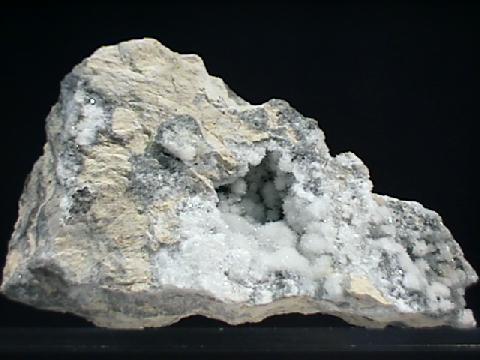
STRONTIANITE
Specimen str-5
$ 45.00
Dims: 5.1" x 3.2" x 2.7" (13.0 x 8.1 x 6.9 cm)
Wt: 1 lb., 13.5 oz. (837 g)
Meckley Quarry, Bedford, Pennsylvania, U.S.A.
This large hand specimen consists of several veins of crystalline and massive Strontianite that run through a shale matrix. One face of the specimen is partly covered with many intergrown clusters of tiny, radiating Strontianite spikes that show moderate damage. None of these exceeds 3 mm in length, so their orthorhombic prismatic form is difficult to study without magnification. They do appear to have goood form, though, and they have a milky-white color and a pearly-to-waxy luster. The more exposed of the clusters show good translucence. The Strontianite clusters are accompanied by random, tiny calcite crystals and possibly some celestites.
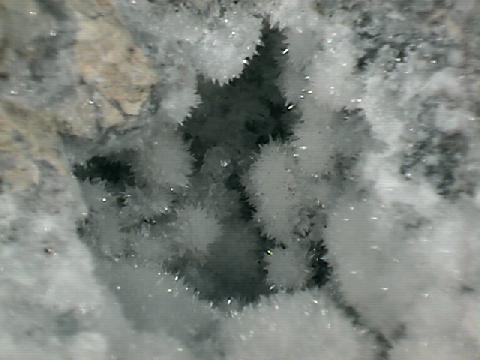
 Amethyst Galleries' Mineral Gallery MINERALS |
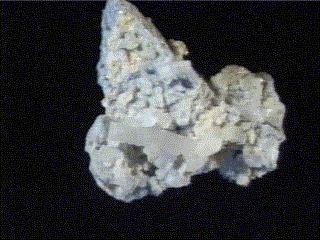
STRONTIANITE specimen str-1
$ 60.00
$ 60.00
Dims: 2" x 1-7/8" x 1-1/8"
Wt: 31 g
Bruck Mar, Obersdorf-Lessing, Styria, Austria
The Strontianite on this specimen is already an uncommon find, yet these pseudohexagonal crystals are unusual even for this mineral. The individual crystals reach up to 1/2 inch long and 1/8 inch wide, and have a waxy luster and striations on the crystal faces perpendicular to length. They rest on a bed of massive Magnesite that has a blue-cream color and a granular form. This material is not at all easy to get, and though small, this specimen is definitely a collector's piece.
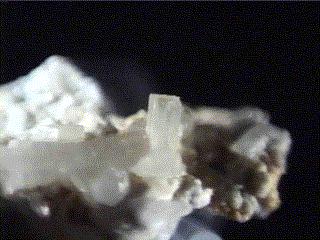

str-1 ($ 60.00)
Bruck Mar, Obersdorf-Lessing, Styria, Austria
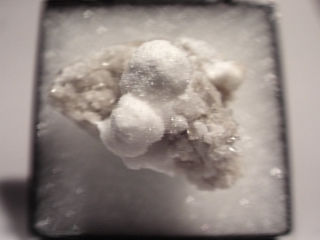
STRONTIANITE specimen str-2
$ 30.00
$ 30.00
Dims: 1.5" x 1.2" x 1.1" (3.8 x 3.0 x 2.8 cm)
Wt: 22.0 g
Muldraugh, Meade County, Kentucky, U.S.A.
This specimen is actually a portion of a geode. It consists of a crust that appears to be made up of a shale or limestone, one side of which is covered with a crust of small calcite crystals and several round clusters of radial, acicular Strontianite crystals. The Strontianites occur as thin, fibrous needles that are tightly compressed together, so that only 1 or 2 mm of their lengths are visible and defined. The clusters that they form range in diameter from 2 or 3 mm to 0.4" (1.0 cm), and are generally in very good condition, though one or two clusters are broken and incomplete. All the crystals have a white color and a pearly luster that make the clusters sparkle. Their tips are colorless and transparent, but the clusters themselves are translucent to opaque. The surrounding calcite crystals are in excellent condition with little damage, and occur as tiny scalenohedral "dogtooth" crystals that do not exceed 3 mm in length. They are colorless and transparent with a pearly luster. The specimen is affixed inside a plastic specimen box with a removable putty.

str-2 ($ 30.00)
Muldraugh, Meade County, Kentucky, U.S.A.
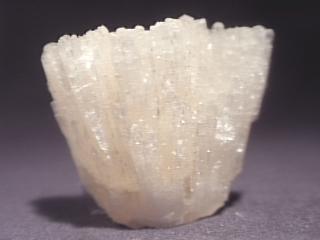
$ 100.00
Dims: 2.0" x 1.7" x 1.1" (5.1 x 4.3 x 2.8 cm)
Wt: 2.95 oz. (83.8 g)
Clara Mine, Drensteinfurt, Wurtemburg, Germany
This thumbnail specimen consists of a tightly packed cluster of scores of long, thin orthorombic Strontianite blades. These blades reach up to 1.7" (4.3 cm) in length and less than 0.1" (3 mm) in width and depth. They are in generally good condition, though if one looks closely, several crystals on the outside of the cluster are broken and incomplete. They all have a very pale cream coloration and a vitreous luster, and are transparent and moderately clear, though many internal fractures and inclusions, along with their somewhat compact habit, diminish and spoil their clarity. There are dozens of tiny black spots on the cluster that look like bits of dirt or dust. Under 10-power magnification, however, one can see that they are actually tiny pyrite crystals that have excellent cubic form and the pale golden color and metallic luster that is standard for the mineral. There is also a visible amount of plain old dirt wedged in the narrow spaces between the crystals, about one-third to halfway down their lengths. It is an impressive specimen, and according to the documentation, was once part of the collection of Fred Pough, a well-known mineralogist, collector, and author of a field guide to rocks and minerals.
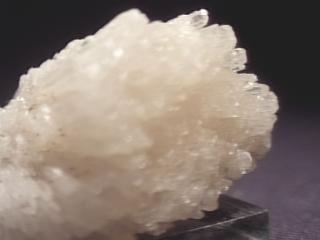

Clara Mine, Drensteinfurt, Wurtemburg, Germany

STRONTIANITE specimen str-5
$ 45.00
$ 45.00
Dims: 5.1" x 3.2" x 2.7" (13.0 x 8.1 x 6.9 cm)
Wt: 1 lb., 13.5 oz. (837 g)
Meckley Quarry, Bedford, Pennsylvania, U.S.A.
This large hand specimen consists of several veins of crystalline and massive Strontianite that run through a shale matrix. One face of the specimen is partly covered with many intergrown clusters of tiny, radiating Strontianite spikes that show moderate damage. None of these exceeds 3 mm in length, so their orthorhombic prismatic form is difficult to study without magnification. They do appear to have goood form, though, and they have a milky-white color and a pearly-to-waxy luster. The more exposed of the clusters show good translucence. The Strontianite clusters are accompanied by random, tiny calcite crystals and possibly some celestites.


str-5 ($ 45.00)
Meckley Quarry, Bedford, Pennsylvania, U.S.A.
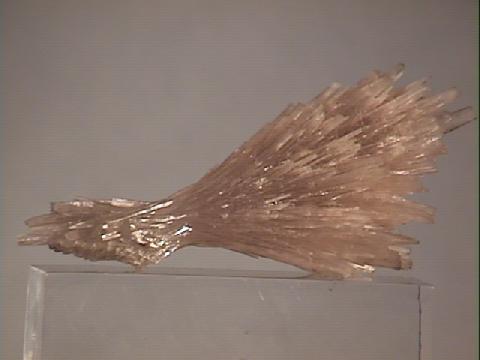
STRONTIANITE specimen str-6
$ 32.00
$ 32.00
Dims: 1.7 x 0.9 x 0.6" (4.4 x 2.2 x 1.6 cm)
Wt: 10 g
Rosiclare Level, Minerva Mine #1, Ozark-Mahoning Company, Cave-In-Rock, Illinois, U.S.A.
This large thumbnail specimen consists of a cluster of heavily intergrown Strontianite crystals that strongly resembles a wheat sheaf. The crystals are not quite needle-like, but they are very thin and radiating. They are in moderately good condition, as many are broken, and reach lengths of 1.2" (3 cm). All have a rather warped, pointed orthorhombic form that is not very easy to define. Their creamy color has a considerable dull-violet tinge and their luster is waxy, and all are essentially translucent, though the tips of some may be transparent. There is no host rock present.

str-6 ($ 32.00)
Rosiclare Level, Minerva Mine #1, Ozark-Mahoning Company, Cave-In-Rock, Illinois, U.S.A.
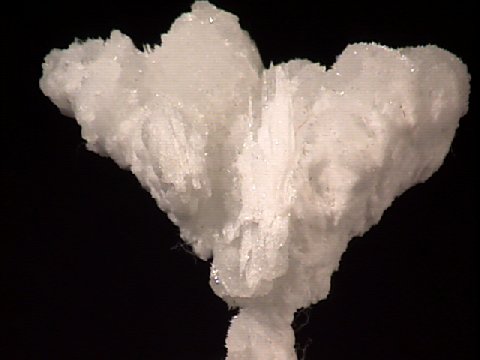
STRONTIANITE specimen str-7
$ 60.00
$ 60.00
Dims: 1.8 x 1.5 x 1.1" (4.5 x 3.8 x 2.8 cm)
Wt: 1.2 oz. (33 g) w/ base
Sub-Rosiclare Level, Minerva Mine #1, Ozark-Mahoning County, Illinois, U.S.A.
Several clusters of tiny,radiating Strontianite blades rest on the white celestite base of this small hand specimen. The largest of these clusters measures 0.6" (1.5 cm) in diameter and, like the others, is in very good condition, showing little damage. Each is made up of scores of tiny blades that do not exceed 1 mm in length and probably have very good orthorhombic form, though they are too small to study even with a loupe. All have a milky-white color and a dull pearly luster, and though individual crystals may be transparent, the clusters are essentially translucent. The celestite base on which they rest shows definite crystalline tendencies, but appears to have been heavily weathered or worn, so that no actual crystal form is definable. The piece is hot-glued onto an acrylic base.
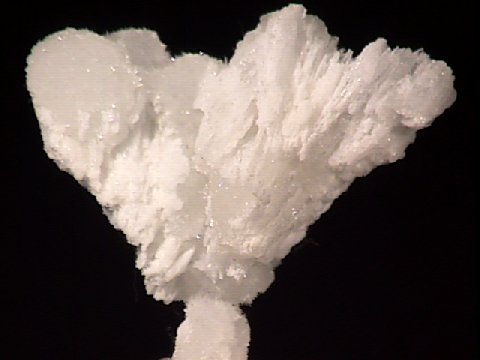

str-7 ($ 60.00)
Sub-Rosiclare Level, Minerva Mine #1, Ozark-Mahoning County, Illinois, U.S.A.
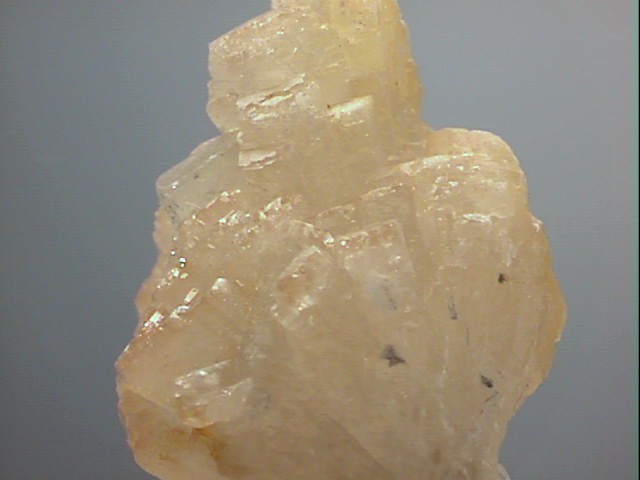
STRONTIANITE specimen str-8
$ 36.00
$ 36.00
Dims: 1.10x0.87x0.63" (2.80x2.22x1.60cm)
Wt: 0.45oz (12.8g)
Oberdorf, Styria, Austria
Unlike many specimens of strontianite, this one shows large crystals in radial clusters. While many of them are merely translucent, the tips of several crystals are very transparent. The color is an off-white, although much (but not all) of the browish tint is due to a thin coating of a brown mineral. The strontianite crystals have basal terminations and a (generally distorted) hexagonal cross-section, which I understand to imply that these crystals are all twins.
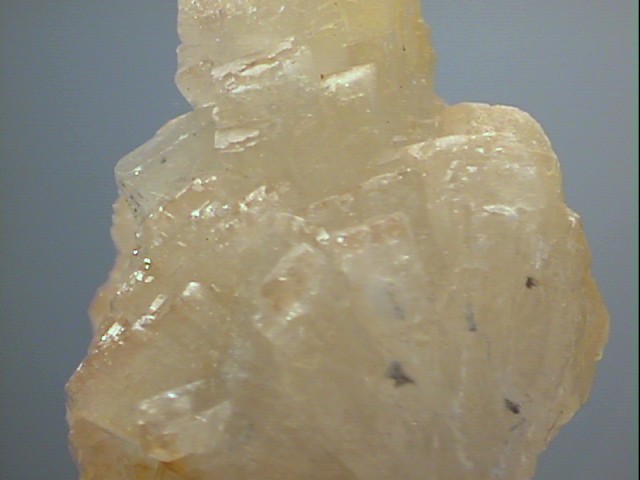

str-8 ($ 36.00)
Oberdorf, Styria, Austria